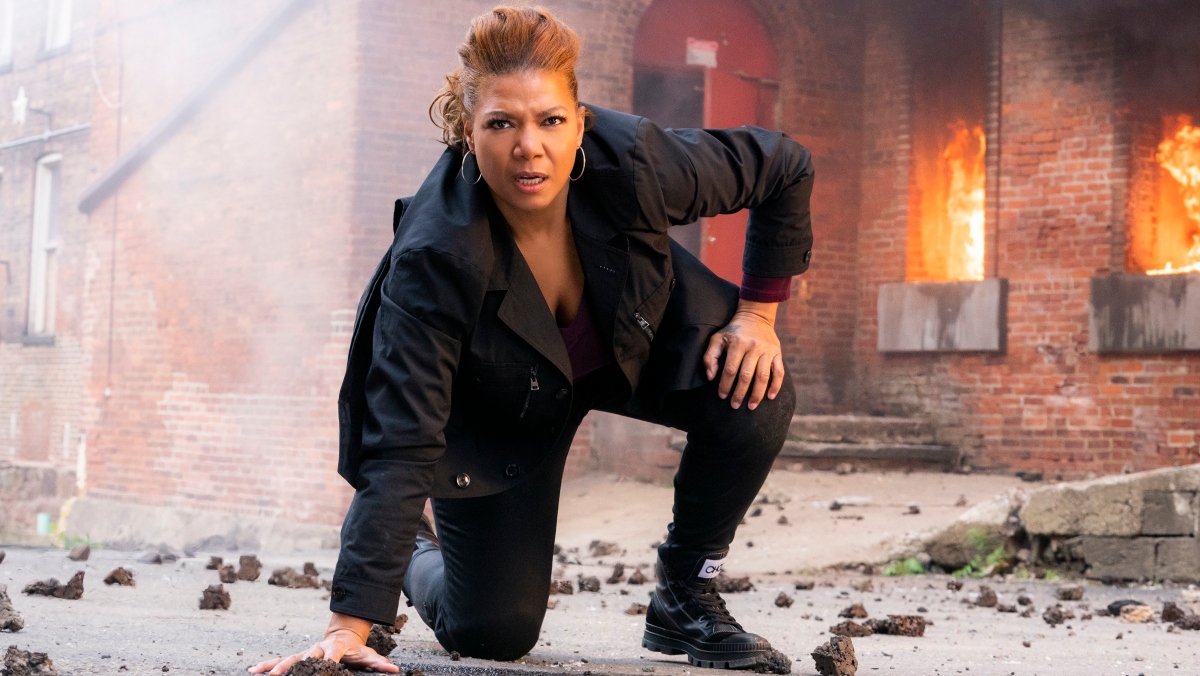It’s not uncommon for musicians to pursue other creative endeavors, particularly acting, to expand their repertoire. But only a handful have done so with such excellency that they achieve equal—or greater—success as an actor. This is true for Grammy-, Emmy-, SAG-, NAACP-, and Golden Globe-winning rapper and actress Queen Latifah. In the midst of her reign as a late ’80s and ’90s hip-hop artist, the Queen brought her talents to film and TV. Since then, she’s become one of the most recognizable and celebrated names in Hollywood; someone with the kind of longevity and role variety that most actors only dream of. Now, she will take on the titular role in The Equalizer (a reboot of the ’80s action-crime series of the same name) as Robyn McCall, a skilled defender pursuing vigilante justice. This latest turn to action is not surprising to anyone who knows Latifah’s career because, well, she can do it all.
Her first leading roles were two starkly different portrayals of what it means to be a Black American woman. She inspired an entire generation of Black journalists as Living Single’s Khadijah James, the editor and publisher of Flavor magazine. The show celebrated Black entrepreneurship and sisterhood with a woman whose lifestyle and goals were realistic and attainable. Khadijah felt like a reflection of Latifah herself—a Black woman using her talents and platform to preserve the culture, push back against misogyny, and provide opportunities for Black people to thrive. Khadijah’s distinct ’90s style, exciting dating life, humor, and frank honesty made her #lifegoals long before Twitter’s existence.

Warner Bros. Television
Then there was Set It Off’s Cleo, a working-class woman who orchestrates a string of bank robberies with her friends. Latifah completely embodied the character, encouraging viewers to see Cleo with empathy in the midst of her morally ambiguous actions. She used the character to unearth familiar frustrations with economic inequity, homophobia, racism, and misogyny that many Black women face.
Of course, there’s the cinematic thrill of Cleo drawing her weapon or speeding off as the getaway driver. But there’s also sadness in Cleo’s hopeless outlook, humor in her heist zeal, and joy in her staunch loyalty. It’s impossible not to feel the weight of her realization about her impending demise as she smokes a final cigarette. This intense and layered role proved how Queen Latifah transcends surface-level depictions of a character.
The seminal film opened the doors for the Queen to explore different genres and types of roles. She gave us vocals and stage performance flare as Matron Mama Morton in Chicago (earning an Academy Award nomination) and “Motormouth” Maybelle Stubbs in Hairspray, two legendary Broadway productions translated to film. Her pitch-perfect comedic timing alongside Steven Martin in Bringing Down the House led to a string of fun flicks. Queen Latifah’s been the skilled getaway driver (Taxi), the Federal Reserve employee-turned-robber (Mad Money), a hairstylist determined to have her own successful shop (Beauty Shop), and even a sweet woolly mammoth in the Ice Age franchise.
Her infectious charm made for romantic comedy gold in Last Holiday and Just Wright as she pushed back against romance heroine stereotypes; she didn’t have to be thin and/or white, or a curvy woman desperate for attention or lacking confidence. Queen Latifah’s versatility garnered ample critical and commercial praise, and led to her making history as the first rap artist to receive a star on the Hollywood Walk of Fame in 2006.
In recent years, Queen Latifah continued to be a consistent force in pivotal roles like the “Empress of the Blues” Bessie Smith in Bessie; the 2015 biopic led to a Screen Actors Guild Award win. She also breathed life into another Black music icon, Hattie McDaniel, in Netflix’s Hollywood, further highlighting Black women who transformed and shaped music. Their music contributions were adjacent to her own, specifically when she dropped “U.N.I.T.Y.” (1993) in a male-dominated music genre to stand for women. But she balances these stories with lighter fare like Girls Trip, playing a jilted best friend on girls’ weekend adventure.

Barbara Nitke/CBS
Queen Latifah’s brilliance shined in real-time with live musical performances in The Wiz Live! and The Little Mermaid Live! as The Wiz and Ursula, respectively. And this is on top of her list of executive producer credits including Scream (TV series), Single Ladies, Bessie, and the upcoming Equalizer series. Every actor has their “not-so-beloved” movies; however, its virtually impossible for Queen Latifah to not play a character well. She consistently elevates whatever material she’s given and creates characters who stick with audiences forever.
It’s why she will rise to the challenge as The Equalizer. Her natural charisma and commanding presence are perfect for a hero balancing normality with a mysterious secret life. She can tap into the grittier aspects yet slide effortlessly into humor and heartfelt moments. And its a rare chance to see a Black woman take on an action role typically reserved for men.
All hail the Queen—a music genius and acting icon. There is nothing out of Queen Latifah’s royal reach, including becoming this year’s big action star.

